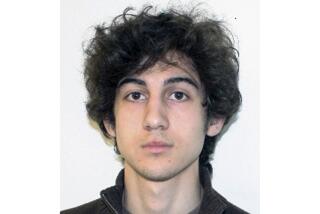Legal questions surround Boston bombing suspect
- Share via
WASHINGTON — Dzhokhar Tsarnaev has become the focus of a heated debate over whether he should receive the Miranda warning or be treated as an enemy combatant.
U.S. Atty. Carmen Ortiz indicated in a news conference Friday night that investigators planned to question Tsarnaev without the standard reminder of his rights to remain silent and to request a lawyer. That could make him the first test of a two-year-old Justice Department policy expanding emergency exemptions when questioning terrorism suspects.
Ortiz’s statement brought criticism from the left and right. Civil libertarians said the decision would erode civil liberties for everyone. But some Republicans said that it did not go far enough, and that Tsarnaev should be treated as an enemy combatant.
“The accused perpetrators of these acts were not common criminals attempting to profit from a criminal enterprise, but terrorists trying to injure, maim and kill innocent Americans,” Sens. Lindsey Graham (R-S.C.), John McCain (R-Ariz.) and Kelly Ayotte (R-N.H.) and Rep. Peter T. King (R-N.Y.) said in a joint statement. Conservatives have long demanded that terrorism suspects not be tried in federal courts.
Ortiz invoked a newly expanded version of the so-called public safety exception to Miranda warnings. The Supreme Court formulated the warnings in 1966 and created a public safety exception in 1980, saying police could interrogate suspects, and use their statements against them, if the lives of police or the public were in danger.
In 2011, after intense criticism of the Justice Department’s handling of the so-called “underwear bomber,” the department expanded the use of the public safety exception in domestic terrorism cases so that it could be invoked in exceptional circumstances even when there was not an imminent safety threat. The changes were made after the suspect in the Dec. 25, 2009, airline bombing attempt, Umar Farouk Abdulmutallab, was questioned for less than an hour before being read his rights.
The American Civil Liberties Union said in a statement that “every criminal defendant” is entitled to the Miranda warning, noting that Tsarnaev became a naturalized American citizen: “The public safety exception should be read narrowly. It applies only when there is a continued threat to public safety and is not an open-ended exception to the Miranda rule.... Denial of rights is un-American and will only make it harder to obtain fair convictions.”
Neal K. Katyal, professor of national security law at Georgetown University and acting solicitor general of the U.S. from May 2010 to June 2011, said invoking the exemption seemed “absolutely appropriate” in this case.
“At least right now, it is right for law enforcement not to be so concerned with self-incrimination and to be more concerned with gathering intelligence,” Katyal said.
The Miranda issue may turn out to be less than crucial. Between the videotape allegedly showing Tsarnaev setting down the bag at the marathon, the shootout with police in which his brother died, and evidence police reportedly found in his apartment, prosecutors probably have a strong case already.
But Graham and McCain said Tsarnaev should stay out of the courts altogether. “We need to know about any possible future attacks which could take additional American lives,” they said. “The least of our worries is a criminal trial which will likely be held years from now.”
Legal experts said there was no basis to treat Dzhokhar Tsarnaev under the law of war because investigators had disclosed no evidence that he was acting on behalf of a foreign terrorist organization.
“With all due respect to the senators, the absence of a relationship to Al Qaeda is absolutely fatal to any ability to subject them to noncivilian trials,” said Stephen Vladeck, a law professor at American University.
“Are we really going to entertain the idea that whenever we have a big bomb go off in America the first thing that happens is the military takes over? Is that what we really want?” said Bobby Chesney, professor of national security law at the University of Texas School of Law, in a telephone interview.
Richard A. Serrano in the Washington bureau contributed to this report.
More to Read
Sign up for Essential California
The most important California stories and recommendations in your inbox every morning.
You may occasionally receive promotional content from the Los Angeles Times.















